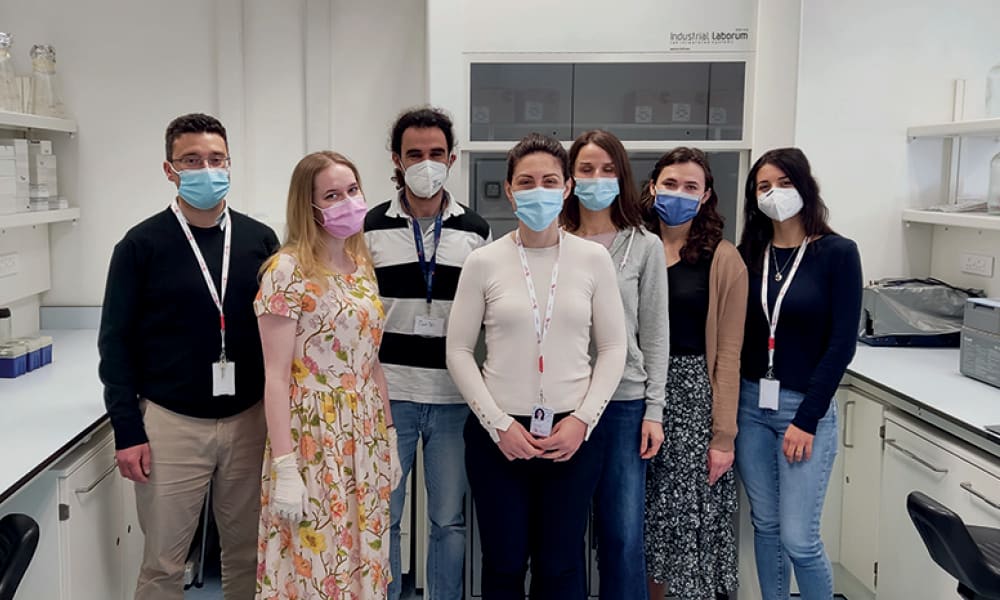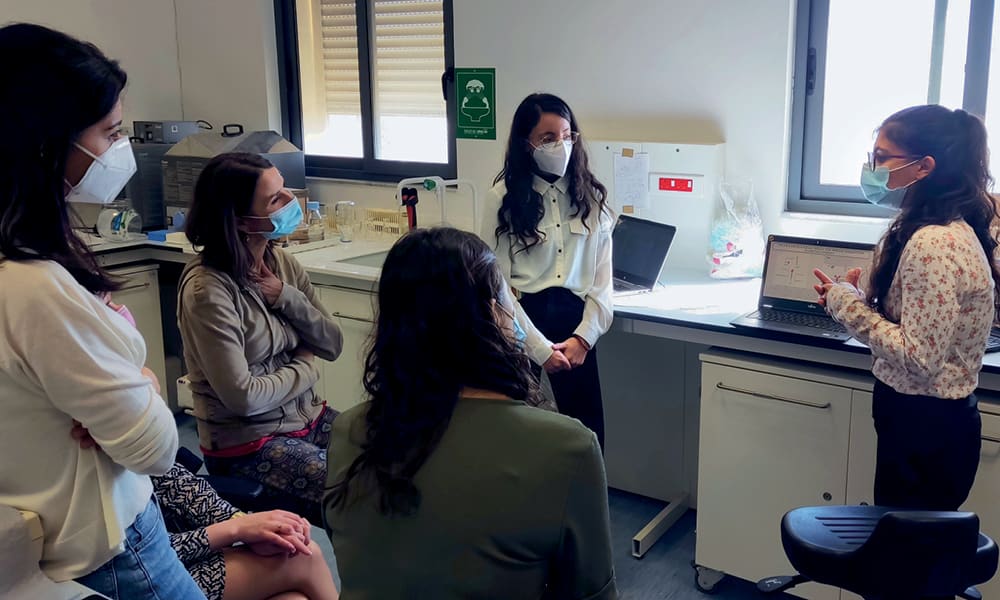Vaccines are very good at preventing infections from becoming severe. Case in point are the SARS-CoV-2 vaccines which effectively brought the world out of lockdown. Despite receiving all doses of a vaccine, however, immunocompromised individuals may not be protected, putting them at risk of developing severe infections. Prof. David Saliba, associate professor at the University of Malta’s (UM) Department of Applied Biomedical Science, explains how his research group is using bacteriophages to engineer antibodies which can provide passive immunity against infectious diseases.
Immunity, Antibodies, and Vaccines
Infectious diseases are often considered humanity’s bane, affecting us since early prehistory. Our capacity to prevent and treat infectious diseases has increased rapidly, thanks to key figures such as Ignaz Philipp Semmelweis, who identified the importance of hand hygiene, and Sir Alexander Fleming, who discovered the first antibiotic: penicillin.
One key breakthrough in the fight against infectious diseases was the creation of vaccines, attributed to Dr Edward Jenner, who invented the world’s first successful vaccine against smallpox. Vaccines expose our immune system to antigens (the molecular surfaces of pathogens). Exposure to antigens triggers an immune response, causing our bodies to create antibodies. These antibodies are ‘magic bullets’ specific to the antigen being injected into the body. Vaccines thus prime our immune system by ensuring that our bodies would already have produced antibodies against specific diseases to prevent the development of severe infections.
Specialised white blood cells, known as B-cells, are responsible for producing antibodies. A singular antibody, referred to as a monoclonal antibody, is the product of a single B-cell and will bind specifically to a singular antigen. A collection of B-cell clones generate a population of antibodies, collectively termed polyclonal antibodies, which all bind individually to different surfaces on the same antigen.
Our body generates antibody populations upon exposure to antigens injected during vaccinations. In this regard, vaccines provide us with active immunity, since our body is actively working to produce antibodies against the infectious disease. Thus, vaccines act as a preventative measure against infectious diseases by ensuring that the antibodies against pathogens are already circulating within our bloodstream upon secondary exposure.
Unfortunately, even when immunocompromised individuals receive all doses of a vaccine, they may still be at risk of developing serious infections due to weak immune systems. Thus, these individuals must rely on other therapeutic approaches to treat infectious disease.
While bacterial infections can be treated with antibiotics, these medicines are ineffective against viral infections. Viruses pose a challenge for our immune systems as they can ‘hide’ inside cells. This explains scientists’ frantic pace to engineer vaccines against the SARS-CoV-2 virus and protect the masses against this disease. Yet, immunocompromised individuals still remain at risk of developing severe infections on exposure to COVID-19, necessitating the development of novel treatment approaches.
At UM, Prof. Saliba and his team are working to engineer antibodies against the SARS-CoV-2 and Zika viruses to discover therapeutic approaches against these infectious diseases, using a technique known as phage display.
Bacteriophages and Phage Display of Antibodies
‘Since the 1970s, scientists have been developing techniques to produce antibodies in the laboratory, and one of the most successful methods is phage display,’ explains Saliba. Phage display was first discovered by Prof. George Smith, and later work by Sir Gregory Winter realised the technique’s potential in producing antibodies. Their work was ground-breaking – to such a degree that they were jointly awarded half of the 2018 Nobel Prize in chemistry.
In nature, viruses known as bacteriophages infect bacteria with their genetic material to hijack the bacteria’s intracellular machinery and produce multiple copies of themselves, destroying their hosts in the process. Prof. Smith and Sir Winter devised a method to genetically modify bacteriophages. These bacteriophages do not kill host bacterial cells to replicate and can display antibodies on their surfaces.

‘We can engineer the bacteriophages’ DNA to code for specific antibodies which are eventually displayed on the bacteriophage, and in doing so, a huge repertoire of antibody fragments may be produced,’ says Saliba. The created bacteriophage population forms a library of different antibody sequences, which can be managed using routine laboratory methods. Isolating antibodies from these libraries that bind and neutralise SARS-CoV2 target antigens would have prophylactic and early-stage therapeutic potential in immunocompromised COVID-19 patients.
Phage Biopanning
An antibody phage library serves as a store of billions of unique antibody fragments. Scientists use this library to identify the appropriate antibody phage against the target antigen being investigated. However, antibody phage libraries do not come with a handy Dewey-decimal classification system, and scientists must utilise phage biopanning to identify complementary antibody phages against the desired target.
Saliba explained how phage biopanning is reminiscent of panning for gold. To fish out a target antibody phage from billions of variations, scientists need to expose the phage library to a target antigen. Then, scientists must purify and replicate the phage antibodies which bind to the antigen to produce a sub-library. This process is repeated until a collection of antibody phages against the target antigen is obtained. Ultimately, single antibodies with high target specificity would then be purified from this collection.

Generating Novel Antibodies Against SARS-CoV-2 and Zika Viruses
In a previous interview with THINK, Giuseppina Monda, a research scientist working with Saliba, explained that the team created 3-dimensional magnetic beads coated with the SARS-CoV-2 spike protein, the active part of the virus responsible for infiltrating our cells. These magnetic beads were then exposed to the research group’s phage library, obtained through international collaborations with the University of Edinburgh and the International Centre for Cancer Vaccine Science in Gdańsk. Through phage biopanning, the research group managed to identify polyclonal antibodies which bind to the SARS-CoV-2 spike protein. By sequencing the monoclonal phages, Saliba’s team was able to discover the specific DNA sequence corresponding to the antibody that binds to the SARS-CoV-2 spike protein.
With such data, Saliba and his team can engineer antibodies which bind very specifically to the spike protein. However, the research group is also working on establishing collaborations to sequence the whole polyclonal population and identify patterns and overlapping trends in the DNA sequences between the polyclonal and monoclonal populations. This process was also successfully replicated against Zika target proteins to demonstrate the technique’s applicability against distinct viruses.
So far we definitely have a really good team of scientists that work very well together. In such a short time frame, we set up a fully validated phage display platform, and I am indeed impressed that we have managed to generate antibodies which bind very specifically to a variety of target antigens. We are also expanding these techniques to other antigens of interest, including cancer-associated targets
‘So far we definitely have a really good team of scientists that work very well together. In such a short time frame, we set up a fully validated phage display platform, and I am indeed impressed that we have managed to generate antibodies which bind very specifically to a variety of target antigens. We are also expanding these techniques to other antigens of interest, including cancer-associated targets,’ says Saliba.
Having successfully identified the antibodies which respectively bind to the SARS-CoV-2 spike protein and Zika envelope protein respectively, the next step in the project is to establish the novel antibodies’ precise effects. Through predictive modelling and computational biology tools, the research group is working to determine whether these antibodies have a blocking effect, which would neutralise the viruses, preventing them from causing infection.
Saliba and his team are hoping that these antibodies will inhibit the normal function of these infectious diseases and act as a promising therapeutic. They anticipate that their ultimate findings will be taken up by industry to provide immunocompromised individuals with reliable treatment against SARS-CoV-2 and Zika viruses.
Project ACCELERATE is funded by the Malta Council for Science and Technology for and on behalf of the Foundation for Science and Technology, through the Infectious Disease Programme.
Glossary
- Antigens: Stands for ‘antibody generating’. These are molecular surfaces of pathogens.
- Antibodies: Specialised proteins which bind to and counteract antigens.
- Immunocompromised: Individuals who have a weakened immune system and are more likely to get ill with COVID-19 or be sick for a longer period.
- Monoclonal antibodies: Antibodies which can only bind to a single surface present on an antigen.
- Polyclonal antibodies: Antibodies which may bind to numerous surfaces present on an antigen.
- Pathogen: Any organism that can produce and cause disease





Comments are closed for this article!